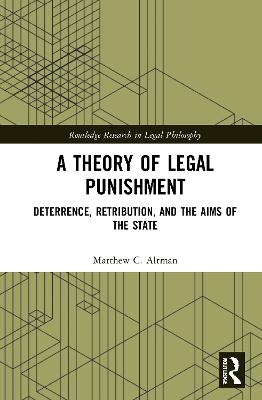
A Theory of Legal Punishment
Routledge (Verlag)
978-0-367-69810-2 (ISBN)
This book argues for a mixed theory of legal punishment that treats both crime reduction and retribution as important aims of the state.
A central question in the philosophy of law is why the state’s punishment of its own citizens is justified. Traditionally, two theories of punishment have dominated the field: consequentialism and retributivism. According to consequentialism, punishment is justified when it maximizes positive outcomes. According to retributivism, criminals should be punished because they deserve it. This book recognizes the strength of both positions. According to the two-tiered model, the institution of punishment and statutory penalties, as set by the legislature, are justified based on their costs and benefits, in terms of deterrence and rehabilitation. The law exists to preserve the public order. Criminal courts, by contrast, determine who is punished and how much based on what offenders deserve. The courts express the community’s collective sense of resentment at being wronged.
This book supports the two-tiered model by showing that it accords with our moral intuitions, commonly held (compatibilist) theories of freedom, and assumptions about how the extent of our knowledge affects our obligations. It engages classic and contemporary work in the philosophy of law and explains the theory’s advantages over competing approaches from retributivists and other mixed theorists. The book also defends consequentialism against a longstanding objection that the social sciences give us little guidance regarding which policies to adopt. Drawing on recent criminological research, the two-tiered model can help us to address some of our most pressing social issues, including the death penalty, drug policy, and mass incarceration. This book will be of interest to philosophers, legal scholars, policymakers, and social scientists, especially criminologists, economists, and political scientists.
Matthew C. Altman is Professor of Philosophy at Central Washington University, USA. He is the author of A Companion to Kant’s “Critique of Pure Reason” (2008) and Kant and Applied Ethics (2011), coauthor of The Fractured Self in Freud and German Philosophy (2013), editor of The Palgrave Handbook of German Idealism (2014) and The Palgrave Kant Handbook (2017), and series editor of Palgrave Handbooks in German Idealism and Palgrave Handbooks in the Philosophy of Law. He has also published numerous articles on applied ethics, philosophy of law, and the history of philosophy.
Part I Defining Punishment
1 Crimes and Burdens
Part II Normative Foundations
2 Preserving the Public Order: A Defense of Consequentialism
3 The Rational and the Reasonable
4 Expressing Resentment: A Defense of Retributivism
5 The Two-Tiered Model of Punishment
Part III Three Arguments
6 The Epistemic Argument
7 The Compatibilist Argument
8 The Moral Argument
Part IV Decision Procedure
9 In Defense of Criminology
10 On Proportionality
11 Jury Nullification and Reflective Equilibrium
Part V Applications
12 Consequences of Capital Punishment
13 Retribution and Restorative Justice
| Erscheinungsdatum | 07.05.2021 |
|---|---|
| Reihe/Serie | Routledge Research in Legal Philosophy |
| Verlagsort | London |
| Sprache | englisch |
| Maße | 156 x 234 mm |
| Gewicht | 566 g |
| Themenwelt | Geisteswissenschaften ► Philosophie ► Ethik |
| Recht / Steuern ► Allgemeines / Lexika | |
| Recht / Steuern ► EU / Internationales Recht | |
| Recht / Steuern ► Strafrecht ► Kriminologie | |
| Recht / Steuern ► Strafrecht ► Strafverfahrensrecht | |
| Sozialwissenschaften | |
| ISBN-10 | 0-367-69810-2 / 0367698102 |
| ISBN-13 | 978-0-367-69810-2 / 9780367698102 |
| Zustand | Neuware |
| Haben Sie eine Frage zum Produkt? |
aus dem Bereich


